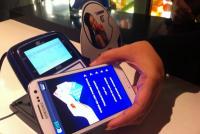Singapore NFC services to finally go live

SINGAPORE--The nation's infrastructure for mobile payments using near-field communication (NFC) technology is ready for launch and will be rolled out in three payment types.
Led by Gemalto, the consortium comprising Citibank, DBS, EZ-Link, and the three local mobile operators--M1, Singapore Telecommunications (SingTel), and StarHub--will be launching nationwide NFC services.

At the briefing here today, the consortium said three types of payment modes--credit, prepaid and stored-value--will be rolled out through NFC-enabled mobile phones in the coming weeks and can be used at 30,000 retail points.
It added that some NFC handsets from Samsung and Sony had been certified for use with the services scheduled for launch. The operators will be launching more NFC phones and in the following months to support the deployment.
Ronnie Tay, CEO of the Infocomms Development Authority of Singapore (IDA), said at the launch that the first rollout of NFC services will focus on retail payments. At the same time, IDA and the consortium are working with the Land Transport Authority (LTA) to assess readiness of mobile payment for public transport by early 2013, he revealed, adding that trials will be conducted at the end of 2012.
Long-term plans coming to fruition
NFC trials in Singapore had begun as early as 2007 by SingTel and StarHub with M1 following suit in 2009, but no commercial services were launched since. The Singapore government in February 2009 said it would facilitate the development of a trusted backbone to serve as the foundation for NFC services.
As a result, the consortium was formed in October 2011, following IDA's call-for-collaboration to develop an interoperable NFC infrastructure and payment services.
Tan Teck Lee, chief innovation and technology officer and Asia president at Gemalto, said the launch is the world's first nationwide NFC deployment. The interoperable infrastructure is hosted by Gemalto, which acts as the "trusted third party" linking the different payment service providers to mobile operators, he added.
The common infrastructure is the first step toward a cashless society in the city-state as it allows all players to connect to each other without worrying about integration issues, Tan elaborated. He went on to note the platform is secure with certification from Visa and MasterCard.
Tan Eng Pheng, senior director for industry cluster group at IDA, said the open ecosystem removes the need for service providers to build dedicated NFC infrastructure. The consortium is now in talks to get more banks to come onboard the platform and add functionalities beyond payment, such as advertising and ticketing for example, he added.
Past trials not wasted
Executives from the local telcos were also keen to stress that past NFC trials did not go to waste as these helped in preparing them for the launch of the nationwide interoperable service.
Chan Kin Hung, head of marketing and products at StarHub, for one, noted that the company started NFC trials as early as 2003 with payment provider EZ-Link. However, he said past trials were done in isolation with small groups and customers could not enjoy the convenience of using their mobile wallets in many areas across the country.
From these trials, the company also found out that customers would not adopt NFC handsets if they are "ugly", Chan added. With more attractive NFC-enabled handsets being rolled out, he believes customer adoption of mobile wallet services would increase.
Alex Tan, director of product development at M1, pointed out that with the unified infrastructure, customers will be able to switch from different mobile operators without worrying about the content of their mobile wallets, which would help spur adoption.
[CORRECTION: The article has been corrected to reflect that IDA and the consortium are assessing the readiness for mobile payments on public transport by early 2013, and not to allow for such a service as previously stated.]